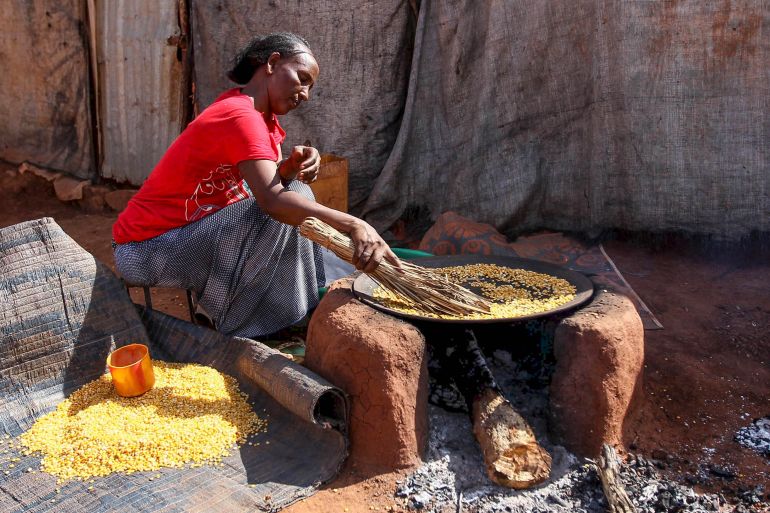Concern grows for safety of Eritrean refugees as Tigray war rages
Eritrean refugees face threats of violence, harassment and food shortages amid conflict in Ethiopia’s Tigray region.

As fighting continues in Ethiopia’s Tigray region, the United Nations is calling for the opening of routes to four refugee camps sheltering Eritreans, who are almost fully reliant on humanitarian aid.
Ann Encontre, UNHCR representative in Ethiopia, said that while refugees live “in harmony” with northern Ethiopians – with whom they share a language and similar culture – “any breakdown of normal life puts those in camps at higher risk, particularly in an area where stocks and access to services are dwindling”.
Keep reading
list of 4 itemsEthiopia plans to close Eritrean refugee camp despite concerns
Sudan braces for up to 200,000 fleeing Ethiopia fighting
Ethiopia: Tigray leader confirms bombing Eritrean capital
Eritreans often leave to escape mandatory, indefinite military service and repression or search for better opportunities out of what has long been one of the world’s most isolated dictatorships.
Approximately 507,000 people – almost one-tenth of Eritrea’s population – had fled by 2018, according to the UN.
Encontre said she is “deeply concerned about the worsening humanitarian situation in Tigray, which is compounded by the lack of access and our current inability to bring in food and supplies to those in need, including the 100,000 Eritrean refugees in the region”.
“While it is difficult to assess the situation on the ground – we have not been able to talk to our teams for the past 48 hours – we fear that civilians, including refugees, could get caught up in the crossfire.
“We need urgent access to the four refugee camps to be able to assist,” she said.
‘We never get peace’
In June, the first person in a refugee camp tested positive for COVID-19. Aid workers worry it will be difficult to monitor any spread of the virus going forward, with limited access.
Across Ethiopia, and the rest of the world, Eritrean refugees with relatives and friends in the camps were struggling to get any information about whether they were safe, due to the communications blackout across Tigray.
An Eritrean refugee, who has friends in the camps, but does not want to be named for security reasons, told Al Jazeera he was frightened about what could happen to them now.
“Because of this war all roads are closed,” he said.
Another Eritrean, who lives in Addis Ababa, said the camps were in “big trouble”.
Even before the conflict, people there were complaining about poor services, and a lack of food or electricity, which led many refugees in the Tigray region to move to cities to try and find work.
People who fled Tigray recently said banks had been closed, food had become expensive and they were terrified of air strikes.
Over the past two weeks, the Eritrean in Addis Ababa, who is in his 20s, said he had heard about multiple Eritreans getting arrested in the capital city, too.
Some who had bought fake Tigrayan ID cards, out of fear they could be deported back to Eritrea, threw them out, suddenly worried about being perceived as Tigrayan.
“The situation in Addis Ababa is very crazy,” he said. He said he had witnessed security forces taking “refugees from their houses at night time without any permission”, going door-to-door and asking for IDs.
The Ethiopian government denies ethnic profiling against Tigrayans is taking place.
In Eritrea, the situation is also tense. The refugee said his father, who is still there, had been called up to fight in the army again, years after being decommissioned.
Another refugee told Al Jazeera that his mother, who lives in southern Eritrea, was being forced to prepare food for the Eritrean army.
“We never get peace, Eritrea and Ethiopia,” he said.
Crossings continue
A 2018 peace agreement between the two countries saw the borders briefly opened. Even after they closed again, last year about 300 Eritreans continued to cross into Ethiopia each day.
Many Eritreans move on to countries including South Sudan and Uganda, or attempt to reach Europe by passing through Sudan and Libya. Refugees in Ethiopia say the war in Tigray may make it difficult for them to stay there.
Some are on the move again, with relatives of those who spoke to Al Jazeera already in eastern Sudan.
They are among more than 36,000 people – mostly Ethiopian – who have now crossed the Sudanese border, making it the largest influx into the region in years. Thousands more are expected to leave Ethiopia daily.
There were already more than 120,000 Eritrean refugees living in Sudan, mostly in the capital city, Khartoum, and camps around Kassala, in the east.
Jason Rizzo, Doctors Without Borders (Medecins Sans Frontieres or MSF) project coordinator at Hamadayet, along the Sudan-Ethiopia border, said new arrivals were struggling to get food, water and shelter.
“UN agencies and organisations on the ground are doing what they can to respond but it’s simply not enough at this stage,” Rizzo said.
Refugees are sleeping outside shops or on the side of the roads at night, he said.
“Our medical teams are hearing that some refugees are risking their lives by going back into Tigray to look for food or belongings they left behind. Others are selling goats or whatever they can manage in order to afford what they need.”